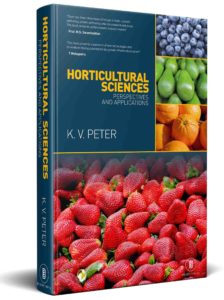The three major dimensions of hunger in India are calorie (energy) deprivation, protein deficiency (access to pulses limited to the wealthy) and micro-nutrient deficiency (per capita consumption of fruits and vegetables are low). Science based horticulture is a powerful tool to ensure nutritional security and the present series Horticultural Sciences: Perspectives and Applications aims to consolidate scientific information generated by eminent scientists on fruits, vegetables, spices, plantation crops, ornamental, medicinal and aromatic plants, tubers including potato, bamboo, and mushrooms. The emphasis is on perspectives and applications of these crops in achieving nutritional security in a sustainable manner.
The present Volume I carries 18 chapters authored by 36 eminent scientists dealing with crops, nutrients, water, post-harvest technologies, value-added products, and preservation in an application intensive perspective. Plant Breeding has been shown both as an art and science, biotechnological approaches for conservation, use of grafting to force growing in stressed environments, polyembryony, physiology and biochemistry of fruit ripening, chemistry of Paclobutrazol, seed borne diseases and their management are a few of the highlights of the 18 chapters. Plantation crops like coffee, cardamom, oil palm and Palmyrah find special elucidation in view of higher price recovery and export. Banana and potato are dealt in detail. Chapter 18 by Gert Groening, International Society of Horticultural Science (ISHS), Belgium deals with urban gardens providing shelter from pollution, both particles and sound in his chapter – “Urban Horticulture Gardens as Elements of an Urbanizing World”
1. Plant Breeding
2. Biotechnological Approaches for ex-situ Conservation and Sustainable Utilization of Selected, Rare and Heavily Traded Medicinal Plants in India
3. Polyembryony
4. Post-Harvest Processing and Value Addition visa-vis Biochemistry of Ginger and Turmeric
5. Non-Thermal Processing of Horticultural Crops
6. Physiology and Biochemistry of Fruit Ripening
7. Chemistry of Paclobutrazol and its Actions
8. Seed Borne Diseases of Tropical Crops – Diagnostics, Transmission and Management
9. Emerging Innovations for Sustainable Spices Production
10. Hydrologic Regimes Under Climate Change in Indo- Gangetic Basin and its Impact on Fruit Production
11. Cardamom
12. Coffee
13. Oil Palm
14. Palmyrah
15. Banana
16. Potatoes
17. Tuber Crops
18. Gardens as Elements of an Urbanizing World


